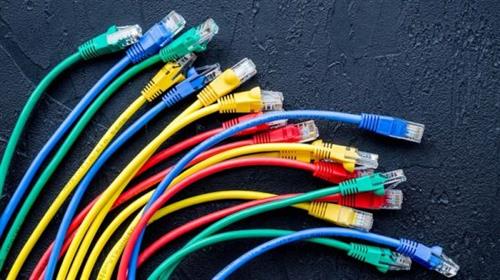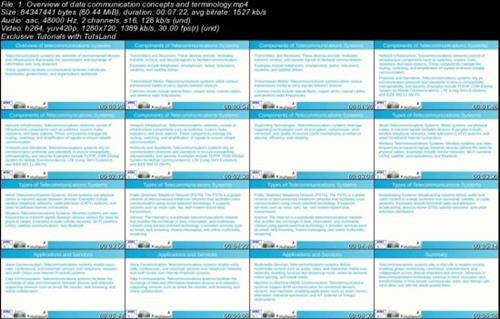- Thread Starter
- #1
Data Communications

Published 4/2024
MP4 | Video: h264, 1280x720 | Audio: AAC, 44.1 KHz, 2 Ch
Language: English | Duration: 1h 55m | Size: 337 MB
Introduction to data communications
What you'll learn
Introduction to Data Communications: Basic concepts and definitions related to data communication, including the OSI model, TCP/IP protocol suite.
Networking Fundamentals: Understanding of network topologies, protocols, and architectures. This may include concepts such as LANs (Local Area Networks)
Transmission Media: Exploration of different types of transmission media, such as twisted pair cables, coaxial cables, fiber optics
Data Encoding and Modulation: Principles of encoding data for transmission and modulation techniques for converting digital signals to analog signals
Multiplexing: Techniques for combining multiple signals into a single transmission medium, including frequency division multiplexing (FDM)
Data Link Control: Understanding of data link layer protocols, error detection and correction techniques, flow control, and addressing (e.g., MAC addresses).
Network Layer: Exploration of network layer protocols (e.g., IP), routing algorithms, subnetting, and addressing schemes (e.g., IPv4 and IPv6).
Transport Layer: Study of transport layer protocols (e.g., TCP and UDP), connection establishment, reliable data transfer, congestion control, and multiplexing.
Application Layer Protocols: Overview of common application layer protocols such as HTTP, SMTP, FTP, DNS.
Network Security: Introduction to basic concepts of network security, including encryption, authentication, access control, firewalls
Wireless and Mobile Communications: Understanding of wireless communication technologies, including cellular networks, Wi-Fi, Bluetooth, and mobile IP.
Emerging Trends: Exploration of recent developments and emerging technologies in data communications, such as IoT (Internet of Things)
Requirements
Basic Computer Literacy: Students should have a fundamental understanding of how to use a computer, including basic file management, web browsing, and software installation.
Mathematics: Proficiency in mathematics is often necessary, particularly algebra and basic calculus. Concepts such as binary arithmetic, logarithms, and probability may be relevant.
Fundamentals of Networking: While not always required, having prior knowledge of basic networking concepts can be beneficial. This may include familiarity with concepts such as IP addressing, subnetting, network topologies, and the OSI model.
Programming Skills: Depending on the course content, some knowledge of programming languages like Python, Java, or C/C++ may be helpful, particularly for understanding networking protocols and implementing network applications.
Basic Electronics: Understanding basic electronic concepts such as voltage, current, resistance, and circuit theory may be beneficial, especially for understanding how data is transmitted over different types of media.
College-level Physics: Some courses may require a basic understanding of physics concepts related to electricity, magnetism, and wave propagation, particularly for understanding principles of signal transmission and modulation.
Information Technology Fundamentals: Knowledge of fundamental IT concepts, such as computer hardware, operating systems, and software applications, may also be helpful for understanding the broader context of data communications.
Analytical and Problem-Solving Skills: Strong analytical and problem-solving skills are essential for understanding complex networking concepts and troubleshooting network issues.
Reading and Comprehension Skills: Data communications courses often involve reading technical documentation, standards, and research papers. Therefore, strong reading and comprehension skills are important for success in the course.
Description
The Introduction to Data Communications course provides students with a comprehensive understanding of fundamental concepts, technologies, and protocols used in modern data communication systems. The course explores the principles underlying the transmission, reception, and processing of digital data over various communication mediums, including wired and wireless networks. Through lectures, hands-on lab exercises, and real-world case studies, students will gain practical skills in designing, implementing, and troubleshooting data communication systems.
Course Objectives
Understanding Data Communication Fundamentals: Students will learn the basic principles of data communication, including data encoding, transmission modes, signal modulation, and multiplexing techniques.
Network Architecture and Protocols: Students will explore the architecture and components of computer networks, including the OSI and TCP/IP reference models. They will also study key networking protocols such as Ethernet, TCP, IP, and UDP.
Wired and Wireless Transmission Media: Students will examine different types of transmission media, including twisted pair, coaxial cable, fiber optic cable, and wireless technologies. They will learn about the characteristics, advantages, and limitations of each medium.
Networking Devices and Technologies: Students will gain hands-on experience with networking devices such as routers, switches, hubs, and access points. They will also explore network topologies, addressing schemes, and subnetting techniques.
Data Link Layer Protocols: Students will study data link layer protocols such as HDLC, PPP, and Ethernet. They will learn about frame formats, error detection and correction techniques, flow control mechanisms, and media access control methods.
Network Security and Management: Students will examine principles of network security, including authentication, encryption, access control, and intrusion detection. They will also learn about network management tools and techniques for monitoring and troubleshooting network performance.
Emerging Trends and Technologies: Students will explore emerging trends and technologies in data communications, such as cloud computing, virtualization, software-defined networking (SDN), and Internet of Things (IoT) devices.
Who this course is for
Professionals working in the field of networking, telecommunications, or information technology who want to deepen their understanding of data communication principles.
Students pursuing degrees in computer science, information technology, electrical engineering, or telecommunications.
Network administrators, system administrators, and IT support staff who need to configure, maintain, and troubleshoot data communication systems.
Software developers and engineers who develop applications that rely on network communication.
Business professionals who need a foundational understanding of data communication technologies for decision-making or managerial roles.
Anyone interested in learning about the fundamental concepts and technologies underlying the internet and modern communication systems.
Homepage:

Download link
rapidgator.net:
nitroflare.com:

Published 4/2024
MP4 | Video: h264, 1280x720 | Audio: AAC, 44.1 KHz, 2 Ch
Language: English | Duration: 1h 55m | Size: 337 MB
What you'll learn
Introduction to Data Communications: Basic concepts and definitions related to data communication, including the OSI model, TCP/IP protocol suite.
Networking Fundamentals: Understanding of network topologies, protocols, and architectures. This may include concepts such as LANs (Local Area Networks)
Transmission Media: Exploration of different types of transmission media, such as twisted pair cables, coaxial cables, fiber optics
Data Encoding and Modulation: Principles of encoding data for transmission and modulation techniques for converting digital signals to analog signals
Multiplexing: Techniques for combining multiple signals into a single transmission medium, including frequency division multiplexing (FDM)
Data Link Control: Understanding of data link layer protocols, error detection and correction techniques, flow control, and addressing (e.g., MAC addresses).
Network Layer: Exploration of network layer protocols (e.g., IP), routing algorithms, subnetting, and addressing schemes (e.g., IPv4 and IPv6).
Transport Layer: Study of transport layer protocols (e.g., TCP and UDP), connection establishment, reliable data transfer, congestion control, and multiplexing.
Application Layer Protocols: Overview of common application layer protocols such as HTTP, SMTP, FTP, DNS.
Network Security: Introduction to basic concepts of network security, including encryption, authentication, access control, firewalls
Wireless and Mobile Communications: Understanding of wireless communication technologies, including cellular networks, Wi-Fi, Bluetooth, and mobile IP.
Emerging Trends: Exploration of recent developments and emerging technologies in data communications, such as IoT (Internet of Things)
Requirements
Basic Computer Literacy: Students should have a fundamental understanding of how to use a computer, including basic file management, web browsing, and software installation.
Mathematics: Proficiency in mathematics is often necessary, particularly algebra and basic calculus. Concepts such as binary arithmetic, logarithms, and probability may be relevant.
Fundamentals of Networking: While not always required, having prior knowledge of basic networking concepts can be beneficial. This may include familiarity with concepts such as IP addressing, subnetting, network topologies, and the OSI model.
Programming Skills: Depending on the course content, some knowledge of programming languages like Python, Java, or C/C++ may be helpful, particularly for understanding networking protocols and implementing network applications.
Basic Electronics: Understanding basic electronic concepts such as voltage, current, resistance, and circuit theory may be beneficial, especially for understanding how data is transmitted over different types of media.
College-level Physics: Some courses may require a basic understanding of physics concepts related to electricity, magnetism, and wave propagation, particularly for understanding principles of signal transmission and modulation.
Information Technology Fundamentals: Knowledge of fundamental IT concepts, such as computer hardware, operating systems, and software applications, may also be helpful for understanding the broader context of data communications.
Analytical and Problem-Solving Skills: Strong analytical and problem-solving skills are essential for understanding complex networking concepts and troubleshooting network issues.
Reading and Comprehension Skills: Data communications courses often involve reading technical documentation, standards, and research papers. Therefore, strong reading and comprehension skills are important for success in the course.
Description
The Introduction to Data Communications course provides students with a comprehensive understanding of fundamental concepts, technologies, and protocols used in modern data communication systems. The course explores the principles underlying the transmission, reception, and processing of digital data over various communication mediums, including wired and wireless networks. Through lectures, hands-on lab exercises, and real-world case studies, students will gain practical skills in designing, implementing, and troubleshooting data communication systems.
Course Objectives
Understanding Data Communication Fundamentals: Students will learn the basic principles of data communication, including data encoding, transmission modes, signal modulation, and multiplexing techniques.
Network Architecture and Protocols: Students will explore the architecture and components of computer networks, including the OSI and TCP/IP reference models. They will also study key networking protocols such as Ethernet, TCP, IP, and UDP.
Wired and Wireless Transmission Media: Students will examine different types of transmission media, including twisted pair, coaxial cable, fiber optic cable, and wireless technologies. They will learn about the characteristics, advantages, and limitations of each medium.
Networking Devices and Technologies: Students will gain hands-on experience with networking devices such as routers, switches, hubs, and access points. They will also explore network topologies, addressing schemes, and subnetting techniques.
Data Link Layer Protocols: Students will study data link layer protocols such as HDLC, PPP, and Ethernet. They will learn about frame formats, error detection and correction techniques, flow control mechanisms, and media access control methods.
Network Security and Management: Students will examine principles of network security, including authentication, encryption, access control, and intrusion detection. They will also learn about network management tools and techniques for monitoring and troubleshooting network performance.
Emerging Trends and Technologies: Students will explore emerging trends and technologies in data communications, such as cloud computing, virtualization, software-defined networking (SDN), and Internet of Things (IoT) devices.
Who this course is for
Professionals working in the field of networking, telecommunications, or information technology who want to deepen their understanding of data communication principles.
Students pursuing degrees in computer science, information technology, electrical engineering, or telecommunications.
Network administrators, system administrators, and IT support staff who need to configure, maintain, and troubleshoot data communication systems.
Software developers and engineers who develop applications that rely on network communication.
Business professionals who need a foundational understanding of data communication technologies for decision-making or managerial roles.
Anyone interested in learning about the fundamental concepts and technologies underlying the internet and modern communication systems.
Homepage:
Screenshots

Download link
rapidgator.net:
You must reply in thread to view hidden text.
nitroflare.com:
You must reply in thread to view hidden text.
